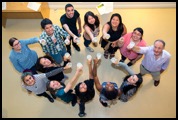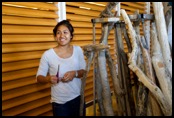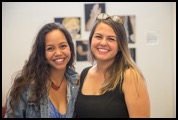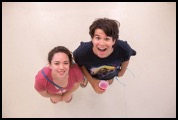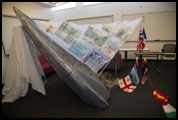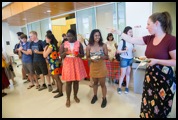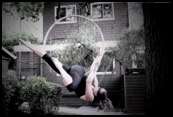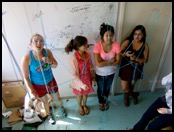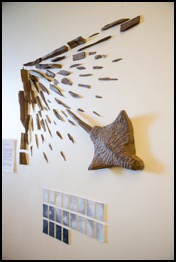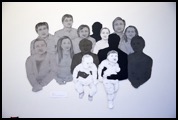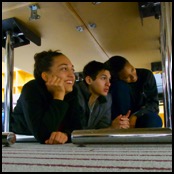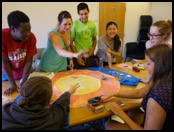The Senior Reflection
FAQs
Stanford seniors majoring in the life sciences are invited to undertake an exciting, in-depth creative project called a Senior Reflection during their senior year. These projects are intended to provide a capstone experience for students interested in the intersection of the arts and sciences. Check out the video about TSR from our first year here.
1. What is a Senior Reflection?
The Senior Reflection is a highly personalized creative project centered on any aspect of biology or the life sciences that has particularly affected a student during his or her education. Each project must include a written component in which the student explains the ideas, background and process that gave rise to the project.
2. What are examples of Senior Reflection projects?
Previous projects have used a variety of media – including documentary film, sculpture, painting, poetry, music, digital art, fiction, dance, photography, and video art – to explore a range of topics such as Alzheimer’s disease and memory, chronic illness, conservation and environmental degradation, the water crisis, autism, and the neurochemistry of emotion. These are just a few examples – in essence, any creative medium or combination of media may be used to explore a concept of personal interest in the life sciences. To see examples of projects from previous years, visit the Exhibition page. Better still, read what graduating seniors had to say about their projects on the Reflections page.
3. Why should I undertake a Senior Reflection if it’s not required for graduation?
An undergraduate capstone experience is designed to bring reflection and focus to the whole of your college experience. Building on the knowledge and skills that you’ve acquired within your major, you will be able to pursue a research question in depth, challenge your own creativity, and engage the wider community in the creation of an artistic project. Studies at many universities have revealed that a capstone experience is often the most memorable academic event of a student’s entire college career. In other words, we expect that TSR will be challenging, fun and deeply rewarding.
4. If I want to produce a Senior Reflection, do I need to enroll in a course?
Yes. Students wishing to produce a Senior Reflection should enroll in BIO196 for 3 units during the fall, winter, and spring quarters of their senior year. For Biology majors, BIO196 is subject to the same unit cap that applies to individual instruction courses – in other words, up to 6 units can be applied toward the Biology major.
5. I’d love to do a Senior Reflection. What should I do to prepare?
The first step is to reflect about what’s important to you, both scientifically and creatively. The second step is to take courses that will prepare you for your senior project. For example, if you’re drawn to immunology, then take some upper level courses in that area to flesh out your knowledge and deepen your understanding. If your creative area of interest is photography or filmmaking, then do your best to enroll in a basic photography or filmmaking course. The optimal experience in producing a Senior Reflection is when in melding areas of expertise, rather than trying to learn on the fly.
6. What will we do in BIO196?
BIO196 is a workshop-based class that meets once a week for 2 hours. Students develop their plans for a Senior Reflection project, obtain feedback and trade ideas with peers, and identify mentors to support the creative components of the project. During fall quarter, students outline and propose a specific project. Winter quarter focuses on production and execution. In the spring quarter, projects are polished and prepared for public exhibition or performance.
7. Will my participation in BIO196 and my Senior Reflection be graded?
Yes.
8. Do I need to find faculty members to mentor my Senior Reflection?
Yes. Each student will identify a faculty member to oversee the scientific content of his or her Senior Reflection. A second faculty mentor (or an individual from the broader community in the Arts, whether inside or surrounding Stanford) will oversee the project’s creative components. We help students to identify mentors during in the fall quarter.
9. If I produce a Senior Reflection, can I graduate with honors in Biology?
The requirements for graduation with honors in Biology remain unchanged. To graduate with honors in Biology, students must complete 10 units of BIO 199 or 199X and complete a research-based honors thesis.
10. Can I graduate with honors in some other way through TSR?
Stanford has a new program for students interested in graduating with Honors in the Interdisciplinary Arts. For students who apply to and are accepted to this program, you can pursue honors through TSR.
11. I’m already doing honors in Biology, but I’d like to undertake a Senior Reflection as well. Is this possible?
Yes!
12. I’d love to make a documentary film for my Senior Reflection, but I have no prior experience with filmmaking. Can I try to make a film anyway?
We encourage you to utilize any creative medium suited to your Senior Reflection project, and we will do our best to connect you with appropriate faculty and resources in the creative arts to provide support, instruction and mentorship for your project. However, we also feel it’s important that your final project be evaluated using the standards of excellence within that field. In other words, if you’re going to make a film or write poetry or incorporate photography into your project, we hope and expect that you will produce an outstanding film or collection of poems or photos. You will receive feedback and input in BIO196 that will help you to identify and develop a feasible, exciting and creative project. In addition, if you are a freshman or a sophomore and you know you’d like to do a Senior Reflection project, please make every effort to enroll in courses that will teach you the basics in your preferred creative medium of expression.
13. My friend loves to compose music and I love to sing. Could we create a Senior Reflection together?
Yes, group-based projects are acceptable. However, each member of the group must play an active role in the conceptualization, planning and execution of the project. In other words, simply being a “performer” in the final project would not be sufficient, although this may represent one aspect of your involvement.
14. Who will see my Senior Reflection when it’s finished?
At the end of Spring quarter, TSR hosts a public exposition of student projects. Performance-based pieces are performed, written works are read aloud and published online, and projects in the visual arts are exhibited. You are welcome to invite friends, family and faculty to the exposition.
15. Are you sure this is a good idea?
Yes, we are!




